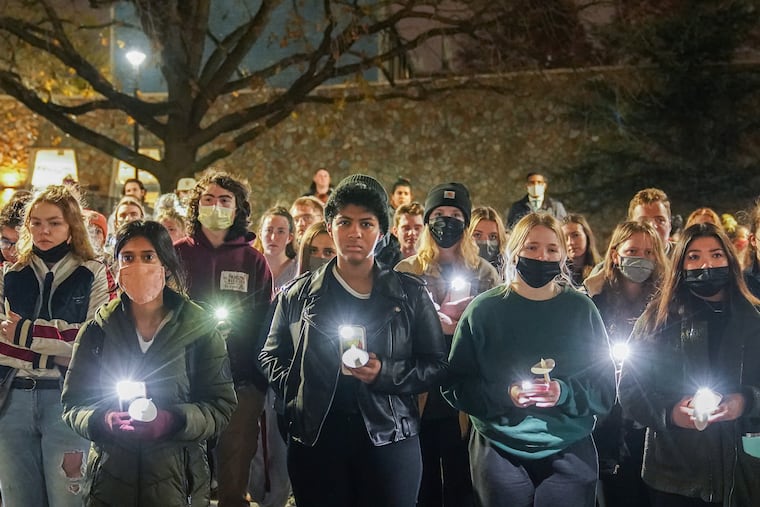Temple will increase its police force following recent shootings near campus, but some worry about overpolicing
About 1,000 people attended an evening vigil to commemorate Temple students who have died this year.

After two shooting deaths near the Temple University campus in the last three weeks, a group of students, parents, and community members rallied on Monday to call on the city to beef up security at the school. But at a forum hours later, some students questioned whether overpolicing would damage Temple’s relationship with the surrounding neighborhoods.
Meanwhile, on Monday evening, about 1,000 people attended a vigil on the campus to commemorate Temple students who have died this year, including senior Samuel Collington, who was fatally shot in the chest on Nov. 28 just after 1:30 p.m. during a carjacking on the 2200 block of North Park Avenue
That incident came 12 days after Ahmir Jones, 18, was fatally shot during a robbery in the early morning hours three blocks from campus in the 1800 block of Cecil B. Moore Avenue.
» READ MORE: Friends and professors remember slain Temple student as kind and courageous: ‘He would fight for anybody’
In the aftermath, some students felt scared walking home from campus, and hundreds of parents called and emailed university officials with concerns.
“Sam felt like one of us, and you can’t help but feel like what happened to him could happen to us at any moment,” said student government president Bradley Smutek.
Police did not respond to questions about updates on Jones’ death. Police charged 17-year-old Latif Williams with Collington’s death last week.
In the wake of the killings, Temple has committed to increasing its police force by 50%, adding approximately 40 new officers, as well as improving lighting, safety technology, and student escort services.
» READ MORE: Temple’s campus is on edge after a student was shot to death: ‘Students are afraid’
Hours after Monday’s campus rally, attended by about 35 people, about a dozen students gathered with university officials and members of Temple’s student government to discuss the college’s response.
Dennis Tanner, a Temple junior and political science major, said he was concerned about how increasing Temple’s police force could make students of color feel. He also said the university and its police needed to improve relations with the community and worried the college could be walling itself off from the rest of North Philadelphia.
“How can ‘us vs. them’ turn into just ‘us’?” he said.
» READ MORE: Family and friends mourn ‘fun-loving’ Pottstown High senior fatally shot by robber
Last week, 1,000 people tuned into an hour-long webinar, hosted by a panel of Temple and law enforcement officials, to hear the university’s plans to improve security.
The increased campus security will mean more officers on patrol, each with a smaller area to cover, said Charles Leone, campus police chief and the university’s executive director of public safety. Campus police are restricted to patrolling the campus and about 500 yards outside its borders and the city is responsible for the rest, Leone said.
Leone said the university is looking at adding new technology after the new year that includes “panic buttons” for students, as well as virtual escorts. It also committed to upgrading lighting, cameras, and emergency phones and increasing the availability of shuttle service and its walking escort program, he said.
To extend police coverage, the university already pays for a team of eight city officers and a supervisor to patrol the area around campus, noted Nashid Akil, captain of the 22nd Police District, which includes Temple.
His district, he said, also will be adding officers when a new class graduates from the academy in January.
Akil cautioned that policing is only part of the solution, and called for more accountability from other parts of the criminal justice system, like the courts and the Office of the District Attorney.
“We need to complete this circle of this criminal justice system to make sure that things are done correctly,” Akil said.
“It makes it difficult for us as Philadelphia police officers and Temple police officers to do the job out there, if we lock an individual up on Friday and on Monday, we see them doing the same thing,” Akil said.
Erica Atwood, senior director for the city’s Office of Policy and Strategic Initiatives for Criminal Justice and Public Safety, said the community cannot “arrest our way out of this problem.”
“That’s how we got here in the first place,” she said, adding that the nation needed to address problems rooted in “systemic racism.”
Communities most plagued by gun violence, she said, tend to suffer from a poor quality education system, lack of access to health care and economic mobility, and little “community connectivity” or “social cohesion.”
The Philadelphia Inquirer is one of more than 20 news organizations producing Broke in Philly, a collaborative reporting project on solutions to poverty and the city’s push toward economic justice. See all of our reporting at brokeinphilly.org.